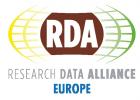You are here
RDA 3rd Plenary meeting: 26-28 March 2014 in Dublin

RDA Third Plenary Meeting - The Data Sharing Community: Playing YOUR part
26-28 March 2014
Croke Park Conference Centre
Dublin, Ireland
The RDA (Research Data Alliance) is now one year old. It is a global, grass-roots organisation dedicated to developing the tools, infrastructure, services, standards and practices that the research community needs to share and exchange its data treasures.
The RDA meeting is focused on taking the global partnerships built in the data sharing community through the RDA’s activities to date, combining these with existing infrastructure and best practices across the data sharing community, and enabling the community to drive forward the changes needed for global data exchange. This plenary meeting is about exploiting RDA’s work to date to its full potential.
Come to Ireland and:
- Meet individuals all over the world and work with them in the RDA Interest/Working Groups
- Take part in ‘Birds of Feather’ meetings according to your own research interests
- Take part in/organise co-located events
- Experience the famous Irish hospitality in Dublin, one of the most friendly and lively European cities.
Register now. Early bird registration till 6th March 2014.
If you are newcomer to RDA, consider attending the Pre-Plenary half-day session on the 25th of March, in order to familiarise yourself with the Interest/Working groups and their missions.
RDA Europe is offering financial support to European Early Career Researchers & Scientists working with Data to attend the plenary meeting (deadline for applications 17th January).
For more information see here.
If you would like to co-locate an event at RDA Plenary 3, please submit an application before 17th January.
For details see here.
You can follow Plenary 3 on Twitter (@resdatall, #RDAPlenary)
ORGANISERS: The event is co-organised by the Australian National Data Service, the Digital Repository of Ireland, the Insight Centre for Data Analytics of Ireland, and RDA-Europe with support from the Australian National Data Service, Science Foundation Ireland, Irish Research Council, and Fáilte Irelan
